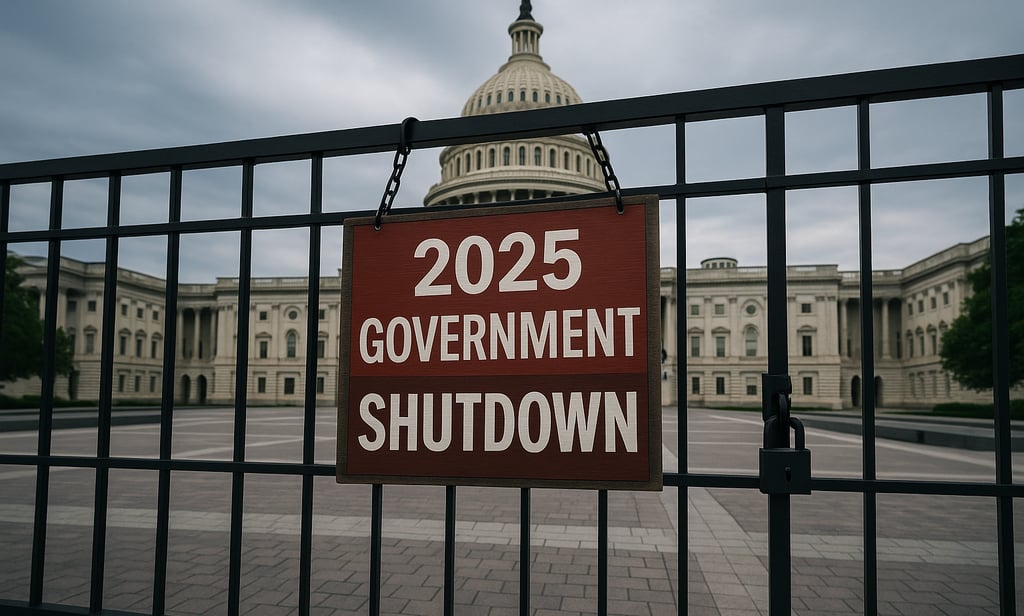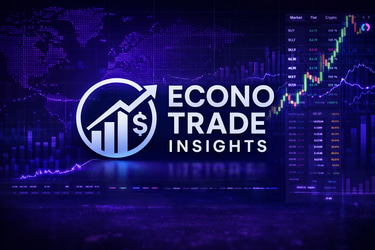Understanding the 2025 US Government Shutdown and Its Impact on Financial Markets
11/17/20254 min read


What is a Government Shutdown and Why It Matters
A government shutdown occurs when non-essential discretionary federal programs are temporarily halted due to the inability of Congress to pass appropriations bills or continuing resolutions. This impasse often arises from budgetary disagreements, where lawmakers cannot reconcile differing priorities or funding levels for various government functions. The implications of a shutdown are significant, affecting not only government operations but also services available to the public and the overall economic stability of the nation.
Historically, government shutdowns in the United States have run the gamut from brief interruptions to protracted standoffs lasting several weeks. For example, the 2013 shutdown lasted 16 days and was primarily driven by disputes over the Affordable Care Act. More recently, in December 2018, a 35-day shutdown occurred due to disagreements over funding for border security, which significantly impacted federal agencies and services. Each instance of a shutdown has underlined the critical role that Congress plays in maintaining government funding and the broader societal implications of its failures to reach consensus.
The immediate impact of a shutdown is most visible in the disruption of federal services. Employees classified as non-essential may be furloughed, while essential personnel are required to work without pay. This scenario not only affects government workers but also has widespread effects on the private sector and local economies that depend on government contracts and spending. In the longer term, prolonged shutdowns can lead to decreased consumer and investor confidence, disruptions in the preparation for and delivery of government programs, and ultimately, a slowdown in economic growth. Understanding these dynamics is crucial, as they may influence financial markets during crises like the impending 2025 government shutdown. The interplay between government operations and financial markets underscores the need for a stable budgeting process, ensuring the steady functioning of both sectors.
Current Trends and Predictions for the 2025 Shutdown
As discussions surrounding the anticipated government shutdown in 2025 gain momentum, it is essential to observe the current landscape and understand the interplay of various factors that may influence its occurrence. Political gridlock persists among key players in Congress, with both parties grappling with divergent budgets and spending priorities. This discord is exacerbated by socio-economic pressures, such as inflation, rising national debt, and ongoing concerns regarding funding for essential services.
Experts predict that the government's attempt to address these financial concerns may lead to a standoff that could provoke a shutdown. Analysts are focusing on specific economic indicators, including unemployment rates, consumer sentiment, and market confidence, which have shown signs of volatility in recent months. Given that public sentiment often shifts in response to economic conditions, the morale of the electorate could significantly impact political negotiations, pressuring lawmakers to reach a consensus.
Furthermore, social media trends indicate a growing apprehension among the populace about the potential fallout from a government shutdown. As citizens become increasingly aware of the implications for social services, military funding, and public welfare programs, advocacy groups are voicing concerns regarding the potential disruptions and hardships that may ensue. The prevailing sentiment is further echoed in online searches focused on financial preparedness strategies, underscoring the need for individuals and families to devise contingency plans in light of uncertain economic conditions.
In light of these developments, it is imperative for stakeholders, including investors and consumers, to stay informed about the political climate and economic forecasts. By remaining vigilant, they can better navigate the anticipated turbulence in financial markets and ensure they are prepared for the potential impacts of the 2025 government shutdown.
Impact of Government Shutdown on Financial Markets
Government shutdowns have significant implications for financial markets, often instigating a wave of uncertainty among investors. When a shutdown occurs, one of the first areas to experience fluctuations is the stock market. Investors typically react negatively to political instability, leading to increased volatility as uncertainty surrounding government operations fuels fears about economic conditions. Historical data suggests that major indices, such as the S&P 500 and the Dow Jones Industrial Average, may exhibit marked declines during prolonged shutdowns. Consequently, market participants might choose to liquidate their positions, seeking safer assets.
In addition to stock markets, bond yields are also affected during government shutdowns. The demand for government securities usually rises, as investors prefer the relative safety of U.S. Treasury bonds during uncertain times. This heightened demand tends to drive bond prices up, resulting in yields falling. Essentially, lower yields reflect risk aversion as investors shift their portfolios to guard against potential financial disturbances arising from a prolonged shutdown. Higher uncertainty may also lead to increased premium rates on corporate bonds, signaling a cautionary approach from investors towards business stability.
Another area subject to influence is the commodity market, where prices can be swayed by shifts in investor sentiment. For instance, commodities such as gold traditionally see increased demand in times of crisis as they are viewed as safe haven assets. This trend suggests that during a government shutdown, investing in gold and other precious metals could be beneficial for mitigating risks. Furthermore, the cryptocurrency market often experiences heightened volatility during such political events. As digital currencies gain traction among investors, strategies to navigate this turbulence become crucial. Investors should consider diversifying their portfolios and engaging in thorough research, aligning cryptocurrency investments with broader risk management strategies amid economic uncertainty.
Navigating Financial Opportunities in Volatile Times
The uncertainty created by the potential government shutdown in 2025 can lead to significant volatility in the financial markets. During such unpredictable times, it is crucial for individuals to adopt strategies that not only mitigate risks but also position them to capitalize on emerging opportunities. One effective approach is to diversify investments across various asset classes. By spreading investments among stocks, bonds, commodities, and real estate, investors can potentially safeguard their portfolios against downturns associated with political turmoil.
Another strategy is to remain vigilant and capitalize on market dips. Economic disruptions often create temporary price reductions in various assets. Investors who are prepared and willing to act during these periods may find opportunities to purchase high-quality investments at discounted rates. This approach requires a keen sense of market timing and an understanding of underlying value—a skill that can be refined with ongoing financial education.
In light of the evolving financial landscape, exploring digital assets, particularly cryptocurrencies, has become increasingly pertinent. These decentralized assets can provide investors with a hedge against traditional market fluctuations, especially during government instabilities. Utilizing platforms such as OKX can serve as a proactive measure in diversifying one's investment strategy through cryptocurrencies. Such platforms often offer valuable tools and insights to assist investors in navigating the complexities of digital asset trading.
Moreover, the importance of financial literacy cannot be overstated, particularly during periods of volatility. Educating oneself about the fundamentals of investing is essential for making informed decisions. Institutions like GO AI-ACADEMY provide comprehensive resources that can enhance one's understanding of financial markets, investment strategies, and risk management. By investing in education, individuals can better prepare for potential market disruptions and enhance their overall financial acumen.
EconoTrade Insights
Learn. Trade. Grow.
Empowering financial freedom through smart education and trusted tools.
© 2025 ECONO TRADE INSIGHTS. All rights reserved.
About - https://econotradeinsights.com/about-us-financial-blogging
Contact - econotradeinsights@gmail.com
Disclaimer - https://econotradeinsights.com/disclaimer
Terms & Conditions - https://econotradeinsights.com/terms-and-conditions
